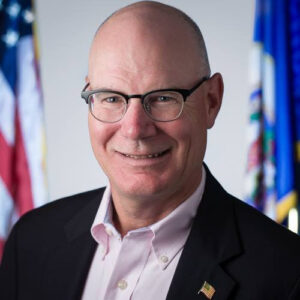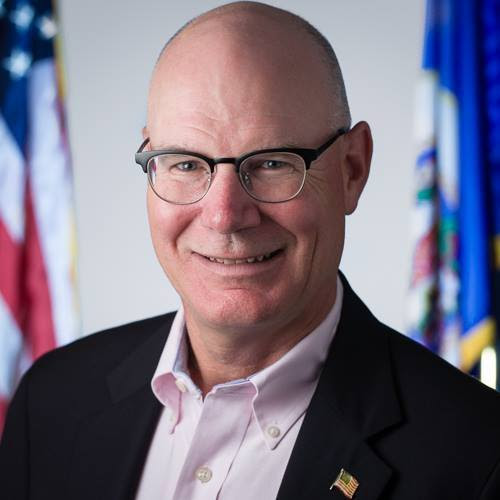by Dennis Dalman
The road to recovery from substance abuse does not stop right after completing a treatment program; in fact, that is where the road to genuine recovery begins, according to John G. Donovan, co-founder and director of Recovery Community Network.
Donovan, who is also an author and public speaker, finds himself especially busy this month, September, which is “National Recovery Month.”
He spoke about the work of the RCN at a recent noon meeting of the St. Joseph Chamber of Commerce. Two weeks later he participated in a 90-minute interview with the St. Joseph Newsleader.
Donovan, a retired U.S. Army major and combat veteran, knows whereof he speaks. He is quick to acknowledge that he himself once had a substance-abuse problem that he has been happily free of for 44 years. He has long had a passionate commitment to helping others.
“It is my vocation,” he said.
Donovan’s own siblings and some relatives have had struggles with substance abuse.
“I have seen the incredible blessings of recovery of so many of them,” he said.
The nonprofit RCN, founded in 2014 and based in St. Cloud, is a grassroots organization that mobilizes and coordinates varied resources (at no cost) to help people struggling with substance abuse. Although its priority is military veterans, it helps others as well. Its service area is within about a 50-mile radius of St. Cloud. RCN receives funding from the state to help veterans.
It has eight staff members, including some volunteers. RCN is located in Midtown Square in downtown St. Cloud. People or their loved ones seeking help can call 320-428-1887 or visit the website at recoverycommunitynetwork.com.
‘Fort Living Room’
Donovan gave an example of how substance abuse can so readily affect military personnel who have trouble adjusting to life back home. One day, he happened to see a sergeant-major whom he had worked with years before. Surprised and happy to see him once again, Donovan asked the man how he’s been doing.
“I’m doing great,” the man said. “Five years sober now.”
Then he explained how 10 years previously, he’d retired from the U.S. Army after serving 20 years previously and then “checked into Fort Living Room.” (a phrase that means the sudden transition from military life – “Fort” – to home life, “Fort Living Room.”)
“I started to drink and stayed in Fort Living Room for five years,” he told Donovan.
In the military, Donovan explained, everything is tightly organized, scheduled and structured with strict rules and protocol. The abrupt transition to unstructured civilian life back home can be jarring, even traumatic. Some former soldiers can feel a traumatic loss or lack of control.
Those wounded in wars or who witnessed terrible things can find at-home transitions especially traumatic: acute pain, nightmares, physical recovery, ongoing therapy, loss of control, relationship problems. Substance abuse can become a temporary “escape” from those pains and pressures.
Kinds of abuse
The most common kind of substance abuse is known as poly-substance abuse. That means a person usually starts with one substance (say, nicotine or marijuana), then later might use and/or abuse other substances, even if only occasionally: say, alcohol, amphetamines, opioids, prescription drugs, heroin or fentanyl.
Donovan blames part of the problem on “Big Pharm” (corporate drug makers) and slick marketing campaigns aimed often at younger people. An example, he said, are some drug companies that assured everyone that drugs to fight pain (like oxycontin and other opioids) were not addictive when, if fact, they were highly addictive and caused many thousands of overdose deaths of people “hooked” on them. After litigation in courts, some of those companies have been ordered to pay billions of dollars in damages.
The people served by RCN range in age from 18 up to 75. Outside of the central Minnesota RCN range, there are similar networks to help people caught in the web of abuse and addiction.
Ongoing recovery
In his presentations, Donovan underlines the importance of ongoing resources for recovery and the dangers of “triggers” that can plunge someone back into an addictive behavior pattern.
Those triggers are stressful life changes (loss of job, sudden homelessness, illness or death of a loved one, marital troubles, worries about children). But triggers can also include euphoric moments like graduations, marriages and other bright or lucky moments that cause elated participants to announce, “Hey, this calls for a drink. Let’s celebrate!”
RCN facilitates peer counseling – for example, former soldiers helping former soldiers – in which mutual empathy stemming from similar experiences and feelings is part of the healing process.
Another vital key to long-time recovery is for the person to find healthy social activities – positive connections, often with peers. RCN helps that happen. Those connections can form a confident strength with which to regain direction and control of one’s life.
One example of positive activities is the annual Minnesota Twins “Rally Caps for Recovery” on Sept. 13 at Target Field to celebrate “National Recovery Month.” The RCN was given 70 tickets that will be distributed to the individuals it is helping on their journey to recovery.
Another RCN resource is its new “Telephone Online Recovery Service” with which staff can contact people in recovery weekly via phone, text or email to find out how they are doing. Seventy-five people have signed up for that service, which is a good morale booster, Donovan noted.
Invest up front
Yet another mission of RCN is to raise public awareness about substance-abuse and its consequences. The public costs – broken homes, medical costs, societal dysfunctions, crime and more – are nearly incalculable, Donovan said.
“Let’s not repeat the lessons of Vietnam (after which problems of many veterans were left to fester)” Donovan said. “We must invest on the front end, not the back end. Everyone can do something. If you see something wrong, step up and help out. Speak up.”
Donovan has a favorite adage: It’s connection, not sobriety, that is the opposite of addiction.
He said he believes strongly that a connection of all people and groups in a community is what can make one and all feel a sense of belonging and thus lessen the divisions and isolation that can lead to substance abuse. The lack of social connectivity during the pandemic, he added, greatly increased substance abuse.
“If we invest on the front end,” he said, “we can create a community that makes recovery a viable option.”
The RCN is constantly raising awareness about the challenges and rewards of recovery. And it constantly works in tandem with other veterans’ organizations (Beyond the Yellow Ribbon and Stand Down, to name just two.)
An example of raising public awareness is the RCN’s annual “Recovery 5k Walk-Run,” which took place twice in recent years on the Woebegone Trail in the St. Joseph area, with help gladly provided by the St. Joseph Police Department.
Donovan
John G. Donovan, who now lives in Big Lake, was born in St. Cloud. He attended St. Cloud Tech High School, Cathedral High School and graduated from St. John’s Prep School. He then earned a degree from St. Cloud State University and a master’s degree in education from Boston University.
Donovan is a peer recovery specialist and serves as an advisor to St. Cloud State University’s Recovery Community. He is a highly decorated U.S. Army veteran, having served two tours of duty in Iraq.
Last year, a book by Donovan entitled “A Soldier’s Recovery Journey” was published. It includes 50 essays on recovery, youth themes and the Armed Forces. That book is available exclusively at Books Revisited in downtown St. Cloud.

John G. Donovan is a retired U.S. Army major and co-founder and director of the St. Cloud-based Recovery Community Network.




